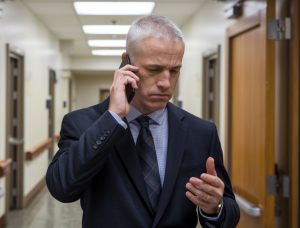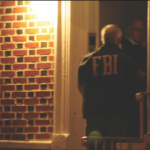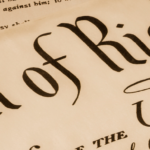No Expectation of Privacy in Conversation Overheard Via “Butt-Dialed” Call
Eavesdropping on pocket-dialed or “butt-dialed” cell phone calls is not a violation of the 4th Amendment, even if the phone conversation is recorded.

The 4th Amendment does not protect a private conversation overheard via a mistaken “butt-dialed” call.
In Huff v Spaw, the 6th Circuit Court of Appeals decided that a person does not have a reasonable expectation of privacy in conversations overheard through pocket-dialed cellphone calls. Mr. Huff pocket-dialed Carol Spaw, who recorded a 91-minute conversation involving sensitive information between Mr. and Mrs. Hufn. Mr. Huff admitted at deposition that he knew the risks of pocket-dialed cellphones and did not take steps to prevent it. The Court of Appeals compared the situation to a homeowner speaking near an open window. Mrs. Huff had reasonable expectations of privacy because she could not be expected to protect Mr. Huff’s phone from pocket-dialing.
Expectation of Privacy in a Conversation Overheard on a Pocket-Dialed Call
With new technology coming out daily, we must be aware of its risks and benefits. The risks are that incidents like Mr. Huff’s might occur to you. Mr. Huff was lucky because he and his wife were not discussing anything criminal. However, had the conversation been criminal in nature, the results could have been dire for Mr. Huff. The lesson here is to be careful with what you say, how you say it, and who may be hearing it. If your phone “butt-dials” someone and they overhear evidence of a crime, anything overheard might be admissible in court, regardless of whether the government has a warrant.
Expectation of Privacy in a Cell Phone Conversation
A court must examine whether there is an expectation of privacy in a conversation to determine whether it can be used as evidence if someone overhears it because the principle of privacy is a fundamental right protected under the law, particularly under the Fourth Amendment to the United States Constitution. This Amendment safeguards individuals against unreasonable searches and seizures, thereby protecting the privacy of conversations. The rationale behind scrutinizing the expectation of privacy is to balance the state’s interest in prosecuting criminal activity with the individual’s right to privacy. If a person reasonably expects that their conversation is private—meaning they have made efforts to keep it confidential and the context supports this expectation—then surreptitiously obtained evidence of that conversation may be deemed inadmissible in court due to the violation of privacy rights. This concept is pivotal in legal proceedings because it determines the legality of evidence collection methods and the admissibility of evidence obtained through such methods. The court’s examination is guided by precedents and the specifics of each case, including the location of the conversation, the parties involved, and the measures taken to ensure privacy. This ensures that evidence used in legal proceedings is gathered in a manner that respects individual rights and upholds the integrity of the judicial process.
Creative, Passionate, Fearless Defense Lawyers for State and Federal Cases
Criminal law and its defenses can change daily. Several years ago, the thought of a pocket-dialed cellphone and having legal issues because it was not even under consideration. The ever-changing criminal law is why you must have an attorney who is up to date on everything related to all defenses available and creative enough to think of additional defenses that can be used to help you. Because of the ever-changing nature of criminal law, you must have an attorney who only practices criminal law. An attorney who practices various areas of the law cannot be an expert in every area of the law and, therefore, will likely miss something in their attempt to represent you. When your freedom is at stake, you must have the best and brightest defense lawyer standing with you. For example, a lawyer can carefully analyze your situation to determine if you had a legitimate expectation of privacy in a conversation and if the evidence is subject to suppression.
When you work with LEWIS & DICKSTEIN, P.L.L.C., you can expect the following from our attorneys:
- Expert knowledge of constitutional law and criminal procedure
- Experience in handling suppression motions and evidentiary hearings
- Strong analytical and strategic thinking abilities
- Aggressiveness in defending clients’ rights
- Excellent oral advocacy and negotiation skills
- A track record of success in criminal defense
- Persistence and determination
- Ability to work under pressure and handle complex cases
- High ethical standards and professional integrity
- Compassion and understanding of clients’ situations

Attorneys Who Will Defend Your Constitutional Rights, Including Your Right to Privacy in Conversations
The attorneys at LEWIS & DICKSTEIN, P.L.L.C. are nationally recognized as top-of-the-line criminal defense attorneys. The firm’s attorneys are award-winning and respected by their peers, the judiciary, and current and former clients. When you think about placing your future in the hands of an attorney, you want the best. The good and affordable criminal defense attorneys with LEWIS & DICKSTEIN, P.L.L.C. are here to help you. Our team will faithfully, zealously, and fearlessly defend your constitutional rights, including your expectation of privacy in conversations, your right to remain silent, and your right to be free from illegal searches and seizures. In most cases, you have an expectation of privacy in a conversation, but the right to privacy is not absolute. We can help you determine if the evidence against you was illegally seized and subject to suppression.
Call us today at (248) 263-6800 for a free consultation or complete an online Request for Assistance Form. We will contact you promptly and find a way to help you.
















